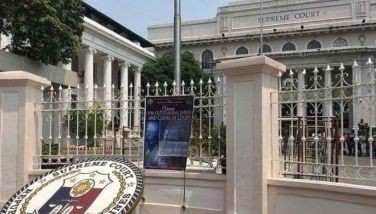DOJ: China recognizes RP claim on Spratlys
MANILA, Philippines – If there is one bright spot in the controversial Joint Marine Seismic Undertaking (JMSU) agreement, it is China’s recognition of the Philippine’s claim in the disputed area, according to Justice Secretary Raul Gonzalez.
Interviewed by reporters at Malacañang yesterday, Gonzalez explained that the JMSU agreement is legal, constitutional, and valid because it is still in a pre-exploration stage.
“In this agreement, it’s very explicit that the claims of the Philippines will not be prejudiced, neither the claims of Vietnam and China,” he said.
The Philippines, China, Vietnam, Taiwan, Brunei and Malaysia are claiming the disputed Spratlys in the South China Sea mainly because of the prospect of finding oil and other valuable resources in the area.
Three of the six claimants – China, the Philippines and Vietnam – entered into the JMSU agreement in 2005 to test a portion of the disputed area for possible oil reserves.
Though it was an undertaking between private companies of the three nations, the governments endorsed the JMSU agreement as a way of promoting peace in the area, it was reported.
“Because at this time the claims here are still mere claims. There has been no international law position yet, except that we claim it as ours and we are happy that with this agreement China in effect recognizes our claim,” Gonzalez said.
The justice secretary is part of the legal team studying the JMSU agreement to come up with a recommendation to the Philippine National Oil Co.-Exploration Corp. on whether it should push through with phase two of the agreement.
He said that the decision would depend on the findings of the first phase of the JMSU which expires in June this year.
“The question is how much have they done in the technical survey, in the seismic survey, in the data gathering, results that will substantiate that potential energy is within,” Gonzalez said.
Gonzalez said that the constitutional issues being raised by critics of the administration would only come into play if and when a decision is made to go with phase two of the agreement.
“So after the pre-exploration, if positive finds are discovered then that will be the time when the constitutional issues will come into play, because then we will be discussing the parameters set forth in the Constitution in Article XII Section 2.”
“But the very provision itself provides that the President can negotiate, provided that the requirements of the Constitution on 60 percent Filipino-controlled corporations would be observed,” he said.
Ombudsman Merceditas Gutierrez also defended the JMSU, saying that nothing is unconstitutional in the provisions of the agreement with China and Vietnam.
In a press conference at the Ombudsman’s office in Quezon City yesterday, Gutierrez told reporters that when the agreement was signed on Sept. 1, 2004, she was then chief presidential legal counsel, and she would have told the President if there was something wrong with the accord.
Gutierrez denied that she had told then senator Franklin Drilon that the JMSU was unconstitutional.
She said that what she told Drilon was unconstitutional was the proposed Joint Geophysical Survey Agreement which would involve exploration, seismic survey operation and basin evaluation, all stages of an exploration cycle.
The proposed geophysical survey agreement, however, was not signed, she said. – With Sandy Araneta
- Latest
- Trending




























